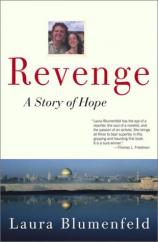Revenge: A Story of Hope
Review
Revenge: A Story of Hope
"An eye for an eye" or "turn the other cheek"? Which course of
action would you take if your father were shot?
Laura Blumenfeld found herself dwelling on this question for 13
years, finally answering it with REVENGE.
In March 1986, four tourists in Jerusalem were shot in the course
of a few weeks, two fatally. Laura's father, American rabbi David
Blumenfeld, was shot while walking back to his hotel from the
Western Wall. The bullet merely grazed David Blumenfeld's skull but
it deeply wounded his daughter's psyche. A staff writer at The
Washington Post, Laura Blumenfeld decided to face the effect
this bullet had on her and her family by exploring the possibility
of revenge against the shooter, a member of a rebel faction of the
PLO.
REVENGE is uniquely personal, and Blumenfeld reveals much of
herself in the writing of it. She dissects her parents' marriage,
their divorce --- so new and raw at the time of the shooting ---
and their evolving relationship as they went on to marry other
people. Indeed, Blumenfeld's conflicted feelings about her parents'
divorce and her childlike fantasies for their reunion play a
distinct role in spurring on her dream of revenge.
Blumenfeld is equally frank about the trials and tribulations of
her own recent marriage to Baruch Weiss, a federal prosecutor and
the son of a Talmudic scholar. Baruch and Laura intend to spend the
first year of their marriage in Jerusalem, where Laura's parents
also honeymooned for a year and a location familiar to Laura
through various journalistic assignments. This year has another
component: Laura is on sabbatical in Israel ostensibly to research
a book on revenge.
In reality, her intention is much less professional.
"I was not a large person, neither ideological, nor heroic, yet for
years I was inhabited by a grandiose thought: my father's injury
should not go unanswered. The shooting was my first glimpse of the
presence of evil in the world --- someone had tried to murder my
father. I was born to American parents who believed the world was
good, who raised us in exquisite illusion. We were taught as
children to respect the sanctity of the individual. The shooter
blew a hole through that. He became a symbol of hatred and
violence. He became an emblem of terror. Terrorism, I believed, was
not so much about killing people as dehumanizing them. I had to
find a way to challenge the terrorist way of thinking. Confronting
him inevitably. Not with an act of violence --- the revenge that I
wanted was of a different kind, one that responded to the heart of
the crime. I set myself a goal that was outsized and naive, and
most of all elusive: I wanted him to realize he was wrong."
Blumenfeld proceeds to do the seemingly impossible: she tracks down
Omar Khatib, the Palestinian who shot her father, now serving a
prison term for his crime.
To get close to Khatib while she considers her revenge, Blumenfeld
presents herself to his family as an objective journalist
interested in the Palestinian/Israeli conflict, careful not to give
the surname that would identify her as the victim's daughter. Over
the course of many months, Blumenfeld insinuates herself with the
shooter's family, obsessed with how best to avenge her father. This
contact with Khatib's family has an unexpected effect, blurring the
edges of the stereotypical terrorist Blumenfeld has formed in her
mind.
If REVENGE were just this, a true story of a woman's search for
personal justice in an unfair world, it would be interesting
enough. Blumenfeld encapsulates her intimate journey within a
broader context, however, turning REVENGE into something infinitely
more compelling.
A historical and social olio of vengeance, punishment, and
reconciliation, REVENGE is peppered with painstaking research
ranging from the biblical to the anecdotal. Blumenfeld travels
within Israel and Palestine and as far as Sicily, Iran, and
Albania, interviewing criminals, national leaders, clerics, and
academics with one thing in common: they're all professional and
amateur authorities on the complexities of revenge.
Occasionally Blumenfeld's personal obsession is irritating in its
shortsightedness. Perhaps, however, that speaks to the intrinsic
honesty of her self-examination and the uncomfortable timeliness of
the subject at hand.
The events of September 11, 2001, make REVENGE more relevant, more
frightening, and even more hopeful than ever before. Ultimately,
REVENGE is a foray into the darkness of all things human and a
tentative journey back into light. It's a rare book that engages
the intellect and the emotions in equal measure; REVENGE made me
think and it made me cry, and then it made me think some
more.
What is revenge worth to you?
Reviewed by Jami Edwards on January 23, 2011
Revenge: A Story of Hope
- Publication Date: April 1, 2003
- Genres: Nonfiction
- Paperback: 384 pages
- Publisher: Washington Square Press
- ISBN-10: 0743463390
- ISBN-13: 9780743463393



